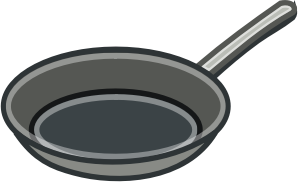A lot of us use cookware that’s coated in Teflon (that blackish stuff in the pan that keeps stuff from sticking). But older Teflon (and when I say old I don’t mean old old, I mean Teflon that you bought just a few years ago) releases a chemical called PFOA when it gets hot (and getting hot it basically what cookware is for). 
The fumes of PFOA can be fatal to birds. Other animals who were exposed to it in labs got cancer, had immune system damage, gave birth to babies with low birth weights, or died. And, of course, people are not immune to it. DuPont (the makers of Teflon) had to shell out a bunch of money a few years ago because people living near one of their plants had much higher rates of cancer than the general population.
DuPont promised to slowly phase out Teflon over the years and completely phase it out by this year. But a lot us still have those pans in our house. A lot of us use these pans for years, even after the Teflon is flaking right off into our food. So it’s estimated that 98% of us have PFOA running through out blood right now.
There are a lot of PFOA-free non-stick pans now. And that’s a step in the right direction. But a lot of people still worry about what else might be lurking in that unnatural non-stick coating. And non-sticks pans don’t usually last very long, which means they usually end up in a landfill somewhere (the pans are recyclable, but that non-stick coating usually isn’t). And no, they’re not biodegradable.
Aluminum isn’t much better. It’s recyclable, but it also might give you Alzheimers.
Stainless steel pots and pans are a better choice. They’re non-toxic, recyclable, and can last for a very long time. Some copper pots are also lined with stainless steel.
Another very green and very popular choice is cast iron. Cast iron is non-toxic. Cast iron lasts a long time, longer than you or I will. In fact, it’s often passed down from generation to generation. That means it can save you money while it stays out of the landfill. If you ever decide you do want to ditch a cast iron pan, someone will probably gladly take it off your hands. And if not, it’s recyclable. Not only that, but it’s indefinitely recyclable. In other words, you can recycle it again and again and it will still be just as good and just as strong each time. Cast iron can rust if not properly taken care of. But the rust is actually good for the earth (plants and plankton like it), and the pans are easy to restore even if they have rusted a bit.
The most important things to know about caring for cast iron are:
- Wash it once with soap and water when you first get it, then don’t wash it with soap ever again.
- Rub it down with vegetable oil (this will keep it from rusting and give it a non-toxic non-stick surface).
For more info on restoring and caring for cast iron pans, check out the following videos:
